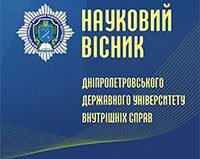Oleksandr TALDYKIN
TALDYKIN O. (2023), SOVEREIGNTY: ATTEMPTED CLASSIFICATION, Scientific Bulletin of Dnipropetrovsk State University of Internal Affairs, № 1, 125-129
DOI: 10.31733/2078-3566-2023-1-125-129
ABSTRACT. The article discusses sovereignty and its types. The interpretation of its variations is given. It is noted that the evolution of the content of sovereignty in modern conditions is undergoing significant changes. The scope of understanding of sovereignty is expanded in accordance with its new manifestations. This approach allows to perceive the components of state sovereignty as separate types.
The difficult nature of international relations, the aggravation of contradictions between the leading states of the world, the ambiguity of the consequences of globalization processes, the armed conflicts of war and the crisis of the 21st century, greatly increase the urgency of issues related to the security of the state and society, which in turn necessitates a thorough analysis and resolution of the complex problems of preserving sovereign rights and freedoms Rethinking, taking into account modern trends, the term «sovereignty», the need for a thorough interpretation of its types, seem, in the author’s opinion, to be of great importance in the context of understanding the independence of decision-making, freedom from external influence, independence of sovereign subjects.
The concept of nation sovereignty depends on the bivariate interpretation of the concept of «nation» itself, according to the dominance of one of two national models: political or ethnic. Political nation: (civic nation) is a set of sovereign community based on the existence of a common institution of citizenship or nationality, regardless of the unity of ethnic and cultural origin – the multiethnic character of the nation.
Ethnic nation: a set of communities based on the unity of ethno-cultural origin.
The realities of the modern world require a more thorough rethinking of the concept of «sovereignty» itself. In our opinion, it is relevant to focus on the study of the fundamental components of state sovereignty. This approach allows them to be perceived as types (subtypes) of sovereignty. The author has already drawn attention to some other fundamental components of state sovereignty in his work «Real Sovereignty of the State in the Context of Globalization».
Virtual sovereignty, or sovereignty in cyberspace, is the ability of states to form their own components of cyber infrastructure and to protect their sovereign rights over these objects in cyberspace. In our opinion, the problem of sovereignty in cyberspace is significantly complicated by the technical capabilities of ensuring state sovereignty in this environment. States are not able to establish comprehensive control over virtual reality, but they are able to create their own resource components and more or less successfully protect their sovereign rights in relation to the objects of this cyber infrastructure.
In terms of the problem of the existence of absolute sovereignty of the state, it is reasonable to define formal (relative) and actual sovereignty.
Modern research shows that the evolution of the content of sovereignty in modern conditions is undergoing significant changes. The scope of its understanding is expanding in accordance with new components. It should be noted that there are
A number of problematic issues, the solution of which will depend on the influence of non-state actors, the existence of a general ethnic consensus in society, and the need for an organic combination of parliamentarism, forms of direct democracy and an effective model of local self-government.
Keywords: sovereignty, virtual sovereignty (in cyberspace), state sovereignty, economic sovereignty, information sovereignty, people’s sovereignty, national sovereignty, political sovereignty, real (absolute) sovereignty, territorial sovereignty, actual sovereignty, financial sovereignty, formal (relative) sovereignty.
- References:
- Taldykin, O. V. (2018) Realnyi suverenitet derzhavy v umovakh hlobalizatsii [The real sovereignty of the state in the conditions of globalization]. Naukovyi visnyk Dnipropetrovskoho derzhavnoho universytetu vnutrishnikh sprav. Spetsialnyi vypusk № 3(94). Р. 65-70. [in Ukr.].
- Taldykin, O. V. External governance of the state in the context of sovereignty problem. Verkhovenstvo prava: doktryna i praktyka v umovakh suchasnykh svitovykh vyklykiv : materialy Mizhnar. nauk.-prakt. konf. (m. Dnipro, 25 liut. 2021 r.). Dnipro : Dniprop. derzh. un-t vnutr. sprav, 2021. 161-164 р.
- Taldykin, O. V. (2022) Suverenitet derzhavy v umovakh merezhevoho suspilstva: deiaki aspekty [State sovereignty in the network society: some aspects]. Mizhnarodna ta natsionalna bezpeka: teoretychni i prykladni aspekty : materialy VI Mizhnar. nauk.-prakt. konf. (m. Dnipro, 11 ber. 2022 r.). Dnipro : Dniprop. derzh. un-t vnutr. sprav. Р.111-112. [in Ukr.].
- Taldykin O.V. Realnyi (absoliutnyi) suverenitet derzhavy ta yoho skladovi v umovakh hlobalizatsii. Problemы pravovoho rehulyrovanyia obshchestvennыkh otnoshenyi : teoryia, zakonodatelstvo, praktyka sb. materyalov Mezhd. nauch.-prakt. konf. Brest, 23-24 noiab. 2018 g, pp.180- 183.
- Jean Bodin Six Books of the commonwealth. Abridged and translated by M. J. Tooley. URL: https://www.yorku.ca/comninel/courses/3020pdf/six_books.pdf.
- Todыka Yu.N. Osnovы konstytutsyonnoho stroia Ukraynы. Kharkiv.: Fakt, 2000. 526 s.
- Smetiukh, V. S. (2014) Natsionalnyi suverenitet yak osnovnyi chynnyk suchasnoho derzhavotvorennia: teoretyko-pravovyi aspekt [National sovereignty as the main factor of modern state formation: theoretical and legal aspect]. Naukovyi visnyk Uzhhorodskoho natsionalnoho universytetu. Seriia : Pravo. Vyp. 27(1). Р. 58–60. [in Ukr.].
- Voloshyna, Yu. V. (2012) Natsionalnyi suverenitet: pravovi pytannia rozuminnia [National Sovereignty: Legal Issues of Understanding]. Pravo i suspilstvo. № 1. Р. 99-102. [in Ukr.].
- The National Strategy to Secure Cyberspace (February 2003). URL : https://www.energy.gov/sites/prod/files/National%20Strategy%20to%20Secure%20Cyberspace.pdf.
- Kaminskyi, I. I. (2017) Kontseptsiia derzhavnoho suverenitetu v konteksti zastosuvannia kibersyly [The concept of state sovereignty in the context of the use of cyber power]. Almanakh mizhnarodnoho prava. Vyp. 16. Р. 3-10. [in Ukr.].
- Priieshkina O. V. Avdieiev O. R. (2020) Polityko-pravova doktryna derzhavnoho suverenitetu v umovakh hlobalizatsii [Political and legal doctrine of state sovereignty in the conditions of globalization]. Sotsialnyi kaleidoskop. № 1. URL: https://socialcaleidoscope.org.ua/ index.php/journal/article/view/19/16. [in Ukr.].
- Badie, B. Le retournment du morde. Sociologists de la Scene Internationale [The Turning of the World. Sociologists of the International Scene] / B. Badie, M. Smouts. Paris, 1992. Р. 35–86. [in Fr.].
